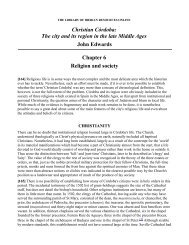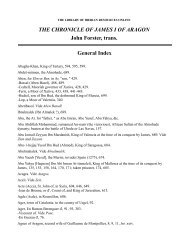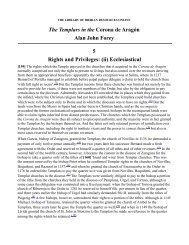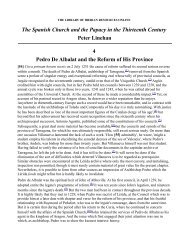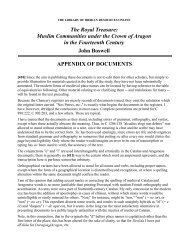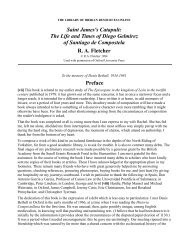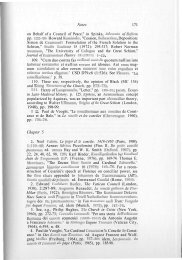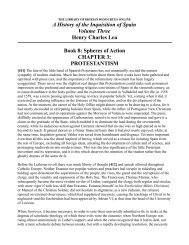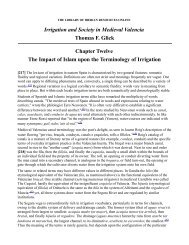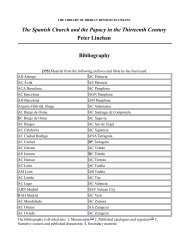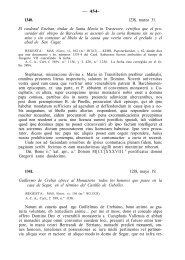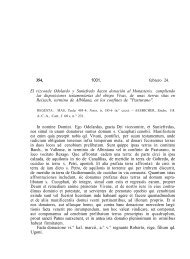Chapter 6 - The Library of Iberian Resources Online
Chapter 6 - The Library of Iberian Resources Online
Chapter 6 - The Library of Iberian Resources Online
You also want an ePaper? Increase the reach of your titles
YUMPU automatically turns print PDFs into web optimized ePapers that Google loves.
immorality. <strong>The</strong> more formal courts <strong>of</strong> the Inquisition punished moral <strong>of</strong>fenders as well as heretics. <strong>The</strong><br />
Church was an open partner in upholding the moral order <strong>of</strong> the city oligarchy, and to many underworld<br />
cynics this partisanship belied its posture as disinterested intermediary.<br />
Another reason for cynicism about the Church as intermediary was that some churchmen were more<br />
concerned with financial affairs than with matters <strong>of</strong> the spirit. <strong>The</strong> Archbishopric <strong>of</strong> Seville owned<br />
much <strong>of</strong> the land within the city walls, as well as large portions in the surrounding areas. Many<br />
religious groups administered extensive estates. In 1582 the Archbishop <strong>of</strong> Seville censured one <strong>of</strong> his<br />
bishops because he had virtually converted his residence into a manufacturing center and store. A great<br />
scandal erupted in 1642 when it was discovered that an administrator <strong>of</strong> the Jesuit School <strong>of</strong> San<br />
Hermenegildo in Seville had used the funds <strong>of</strong> his order for business speculations, buying and selling<br />
cargoes in the Indies and enriching many <strong>of</strong> his relatives while amassing a debt <strong>of</strong> 90,000 ducats<br />
against the Jesuits. (7)<br />
Ecclesiastical privileges benefited many churchmen in commercial enterprises, and it also provided<br />
many opportunities for the white collar crimes <strong>of</strong> smuggling and counterfeiting. Clerics and Inquisition<br />
<strong>of</strong>ficials were exempt from import duties, and they transported goods and papers without customary<br />
inspection at city gates. Occasionally they were caught smuggling precious metals and merchandise. (8)<br />
<strong>The</strong>oretically outside the jurisdiction <strong>of</strong> secular justice, religious houses could be used for undercover<br />
counterfeiting. In 1639 a clergyman was arrested for counterfeiting the stamped paper that was required<br />
for all legal and [121] commercial transactions in the seventeenth century, and thirteen years later<br />
secular authorities invaded a monastery to arrest some clergymen who were restamping money there.<br />
(9)<br />
Ecclesiastical privilege permitted many people to escape the hand <strong>of</strong> secular justice that lay so heavily<br />
on people <strong>of</strong> the underworld. <strong>The</strong> numbers <strong>of</strong> familiares, lay servants to the Inquisition, increased<br />
dramatically as the Inquisition became more active during this period. Suspected <strong>of</strong> being secret<br />
informers, the familiares were also unpopular because they had the privilege <strong>of</strong> bearing arms and were<br />
exempt from certain prosecutions by secular authorities. <strong>The</strong> confusion resulting from the many new<br />
and unregistered appointments <strong>of</strong> familiares was very useful to those <strong>of</strong> the underworld, who would<br />
sometimes escape the secular law by claiming that they were familiares when they were arrested. (10)<br />
Underworld people could also feel cynical about the Church when churchmen squabbled among<br />
themselves. <strong>The</strong> rivalry between Jesuits and Dominicans <strong>of</strong>ten degenerated into a power struggle<br />
involving the Inquisition, for it had been dominated by the Dominicans since Tomás de Torquemada <strong>of</strong><br />
this order was appointed by Ferdinand and Isabella to head the Inquisition in 1483. Jesuits were<br />
denounced for heresy and for making political sermons. <strong>The</strong>y insisted that they were responsible for<br />
their own members and would punish them for misbehavior, but the Inquisition asserted that these<br />
matters were subject to the Holy Office. In the case <strong>of</strong> Padre Barba, for example, a Jesuit accused <strong>of</strong><br />
having "dishonest relations" with several women, the Society <strong>of</strong> Jesus argued that this was a matter for<br />
internal discipline within the Order, but the Inquisition successfully asserted jurisdiction. (11) <strong>The</strong><br />
Dominican-Jesuit controversy was further complicated because some bishops, opposing the Inquisition<br />
as a [122] rival to their own powerful positions within the Spanish Church, encouraged the Jesuit-<br />
Dominican controversy in order to weaken the Inquisition.<br />
Attempts to correct abuses and reform the clergy increased internal dissension within this group. When<br />
Cardinal Archbishop Rodrigo de Castro tried to reform the clergy in Seville in the last quarter <strong>of</strong> the<br />
sixteenth century, he ran into so much opposition that he asked the Crown to help him get support from<br />
Rome. He succeeded in making several reforms, but at the price <strong>of</strong> much dissension. Reformed monks<br />
attacked the unreformed secular clergy, a form <strong>of</strong> anticlericalism which one scholar has identified in the



